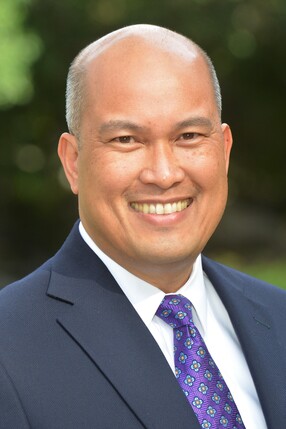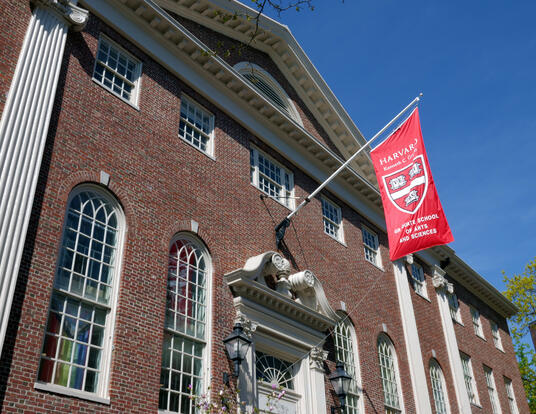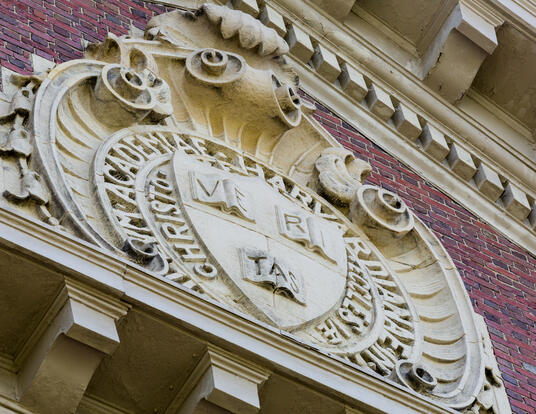Taking on the Challenge of Student Support
New dean of students discusses needs of graduate students in—and out—of trying times
After an extensive national search, GSAS Dean Emma Dench announced on February 3, 2021, the appointment of Sam Bersola as the School’s new dean of students. A seasoned professional with 30 years of experience in higher education, Bersola comes to GSAS from the University of California, Los Angeles, where he served as assistant vice provost for graduate education. On the eve of Dean Dench’s announcement, Bersola spoke to GSAS Communications about the challenges graduate students face at this moment in higher education, what he’s learned from the COVID-19 pandemic, and how he looks forward to working with his colleagues to expand equity, inclusion, and diversity at the School.
It’s been a year now that the pandemic has been with us and nearly a year since Harvard and universities across the country dramatically altered their educational model in response. How would you characterize this moment in higher education? What sort of lasting impact will the pandemic have on the student experience at a place like GSAS?

When it comes to support for graduate students in particular—who are the heart of any major research university—the pandemic has highlighted old challenges and brought forth new ones.
In terms of old challenges, the pandemic’s restrictions on travel and movement have only intensified the need for immigration reform. It should be much easier for international students and scholars to come to US campuses to study, and then to live and work in this country after they graduate. The pandemic has also underscored the ways in which family obligations and personal pressures have an impact on graduate students. So many have had to take care of children during the pandemic, or care for aging parents and grandparents, or deal with a family member’s sickness or job loss. It takes an immense amount of a students’ time and energy.
In terms of new challenges, those who teach have had to adjust their method of delivery, adjust syllabi and grading systems, and learn new technology. Teaching assistants and fellows, for instance, are making great sacrifices, waking up at odd hours in time zones throughout the world to lead discussions and share knowledge with other students. The pandemic has had an impact on graduate research, too. The fact that students can’t travel to conduct research has delayed projects or forced researchers to redesign them altogether. And institutions like Harvard and UCLA have had to adjust policies, practices, and expectations when it comes to dissertations and time-to-degree.
Looking forward, I think we’ve gotten a clearer understanding of the fact that graduate students are a vital and vulnerable population that needs a great deal of support. The good news is that the response to the pandemic has yielded new tools for delivering that support–whether for teaching, research, mentoring, career exploration, or professional development. At UCLA, for example, the remote delivery of professional development workshops has been a tremendous success. More students participated than they did in person! I don’t think that’s going away after the pandemic. I think students will continue to expect us to use technology to bring them more services, more conveniently. One of the challenges for us in the years ahead will be to find the right balance between in-person and online experiences.
How do you envision partnering with the GSAS Office of Diversity and Minority Affairs (ODMA) in their effort to create “an inclusive environment where all students can thrive and grow academically and personally”?
At each of the institutions where I’ve worked, I’ve supported and led teams that are committed to students from groups that have been historically underrepresented in higher education including racial and ethnic minorities, LGBTQI communities, students who are differently abled. We’ve removed obstacles to matriculation, to retention and to student success and we’ve worked hard to create safe, respectful, equitable, and inclusive environments.
I hope to work toward those same goals at GSAS. I’ve known [Dean of Academic Programs and Diversity] Sheila Thomas for over five years now, ever since she and I met on the road, recruiting diverse students who participate in pipeline programs for graduate education. I admire her and her work very much and I’m excited about being her GSAS colleague. As dean of students, I will support and collaborate with Dean Thomas and ODMA in any way that I can.
Higher education was in the midst of a student mental health crisis before the pandemic, which has only increased isolation, disconnection, and financial and personal stress. In that context, size up the challenge of student wellness. How do you hope to approach the problem and help create an environment where students can not only do their best academic work, but also flourish as human beings?
Well, the national data shows that graduate students are more likely to take advantage of mental health services. That’s hopeful in the sense that they’re reaching out for help, but it’s also an indication of the need. The challenge at Harvard is that these are brilliant, accomplished people. They were successful in secondary school. They were successful in college. They got into Harvard’s PhD program. So, they think that they can take care of their problems themselves—or that they should. But in many cases, they can’t.
Doctoral work can be a lonely process. I think it’s important for departments to reach out to faculty and the broader community so that everyone can better recognize when a student is having trouble and make referrals. At UCLA, we hired two new graduate student case managers who attend department meetings to talk about the signs of student distress and concern and advise faculty and departmental staff how and when they should refer these students. . We wanted departments to be more informed about ways to help students. And it’s been a big plus because faculty started calling us for advice and doing it earlier. I think we were doing a better job of identifying students who needed help.
The problem goes way beyond academics. It has an impact on finances, on housing, and on interactions with other students. Thanks to modern medicine and improved access to mental health services, there are a lot of students in graduate school that probably wouldn't have been decades ago. That’s a very good thing, but it also means that those students need at least the same level of support that we provide to undergraduates. I’ll do all I can to see that they get it.
I think we’ve gotten a clearer understanding [during the pandemic] of the fact that graduate students are a vital and vulnerable population that needs a great deal of support.
What are you most looking forward to about your new position?
This is my dream job and I’m so honored to be the new dean of students. There is nothing I’d rather be doing. I look forward to meeting students and working with a talented and committed staff that supports student life and student success. I’m also looking forward to returning to one of the most exciting intellectual hubs of the world. And, like new students who can’t experience Harvard physically right now, I look forward to embracing my new community remotely and look forward to experiencing the total university environment soon.
What do you love to do when you’re not doing higher ed administration?
I love to cook, especially Filipino food, and I’m learning more from online tutorials. My mom was an excellent cook and my dad worked in the galley of the US Coast Guard Academy (New London, Connecticut) where I was born. I love the theater and I’m looking forward to seeing what will be playing in Cambridge, Boston, and NYC. I also love tennis and college football. And I really miss going to the gym.
Finally, you’ve been out in sunny southern California for some time now. Any qualms about moving to the notoriously unpredictable—and often inclement—New England climate?
I was born in Connecticut, I got my master’s degree at Harvard’s Graduate School of Education (GSE), and I worked at Amherst College in western Massachusetts after that, so moving to New England is actually a homecoming. My time at the GSE was amazing and too short—a one-year master’s program—and it allowed me to transition from a career in engineering to one in higher education. When I worked at Amherst in western Massachusetts, I loved the change of seasons and the New England country towns. I’m looking forward to returning to the Cambridge/Boston area and seeing all that’s grown and changed since I was there.
Get the Latest Updates
Join Our Newsletter
Subscribe to Colloquy Podcast
Simplecast Stitcher




